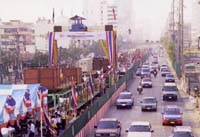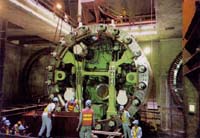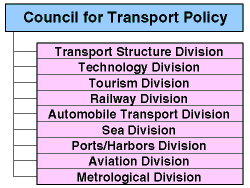(1) Though Japan's transport system faces many issues
to be resolved, it has grown to support what is now the second largest economy
in the world. In an effort to battle the severe natural conditions here,
a number of transport infrastructure projects are developed throughout the
country using the world's latest technology. In addition, while automobile
transport has significantly developed, a transport system has materialized
in which rail and sea transport fills an all-important role in response
to the density of the living environment and geographical conditions of
Japan surrounded by the sea, etc. In the future, environmental restrictions
will continue to be strengthened, which rises the question of how we can
continue to maintain and improve our transport systems in our society while
making an effort to meet the demands for freer and more comfortable mobility.
This council has looked back on the transport systems of Japan until now
in order to find answers to this issue. Based on the objective of creating
"mobility reforms that encourages change as well as responding to the
changes in its socio-economy", we have made forecasts of the socio-economic
state of affairs that will change as we pass through the 21st century. As
such, we have put forward our fundamental ideas on the requirements for
the creation of a transport system that is suitable to the new era. Naturally,
we would like to stimulate debate among the citizens of Japan in regards
to this.
Furthermore, taking these differences in comparison to Western countries,
we feel that, through international cooperation, it is an important global
scale measure to pass on the experience and technology gained through the
creation of our transport systems over many years of repeated effort onto
other Asian countries that face problems with their transport systems.
The 21st century is expected to produce a number of technological innovations,
and as such, there are tremendous possibilities apparent in regards to the
realization of providing innovative services and fundamental solutions to
the various issues through the development of technology in the field of
transportation. For achieving this, we would like to state that we feel
it extremely important to contribute to the speeding up of transport systems
as well as to undertake the development and implementation of technology
that contributes to upgraded use of space, the reduction of pollution, energy
saving and a wide range of speeding up efforts in addition to the items
mentioned in detail in this report.
(2) In order to achieve the policies presented in this report, collaboration
with all related ministries and agencies as well as public entities is essential.
The Ministry of Land and Transport will be inaugurated in January 2001 -a
amalgamation of the Ministry of Transport, Ministry of Construction, National
Land Agency and Hokkaido Development Agency- to face the dawning of the
21st century. We expect that all of the policies mentioned in this report
will be implemented strongly mainly by this Ministry, which is in charge
of all construction of transport systems, with the cooperation of the police
and other related institutions.
Furthermore, many of the policies presented here require medium to long-term
efforts. To that end, a new Council for Transport Policy will be set up
within the Ministry of Land and Transport as the successor of this present
council and is expected to follow up on the state of implementation of this
report from now on. |





